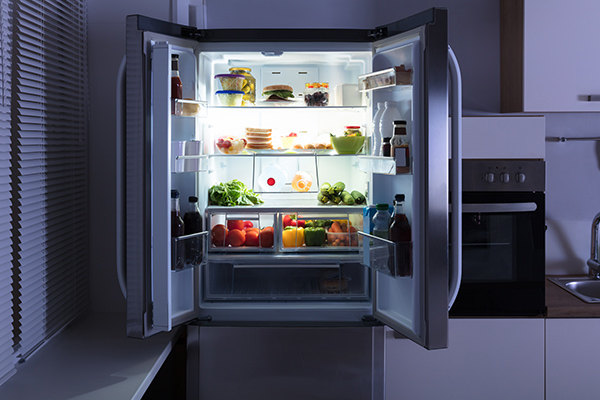French doors, door-in-door storage, exterior door windows… today’s premium refrigerators have moved beyond barely-dressed ice boxes and coolers. The same goes for refrigerator interiors, which often require custom assemblies and sub-assemblies with premium shelving. Plastic shelves and bins just won’t cut it for discerning consumers seeking high-end aesthetics, as well as increased functionality and durability.
Previously considered too fragile for refrigerators, glass is now the new shelving go-to, along with decorative metal trim and components. Tempered glass and custom metal components provide exceptional durability over plastic, as well as a “crafted” interior appearance consumers expect from their premium refrigerator investment.
Here are a few advantages that tempered glass and metal have over traditional plastic shelving and bins.
Form Finds Function
Plastic shelving and bins are still popular in many mainstream refrigerator interiors because of their perceived durability. The plastic’s transparency also makes it easy for consumers to locate food items at a glance. However, plastic shelving and bins are prone to cracking over time and tend to sag under the weight of heavy objects.
Tempered glass and custom metal shelving offer more durability and a more crafted look for premium refrigerator interiors. Achieving this level of craftsmanship requires the expertise of a full-service metal manufacturer who is well-versed in custom kitchen assemblies and sub-assemblies.
An experienced turnkey metal part and assembly manufacturer can create refrigerator interior improvements that deliver:
- Enhanced aesthetics: Metal and glass provide a “cleaner” look, especially for door-in-door and french door assemblies.
- Easy maintenance: Food bacteria and stains tend to “settle” into plastic, while metal and glass resist stains and are easier to maintain.
- Increased efficiency: Metal and glass are less prone to wear and tear from repeated movements in modular, adjustable shelves and bins.
Metal Meets Glass
It takes years of custom assembly know-how and engineering expertise to combine metal and glass in precise configurations required for premium refrigerator interiors. While less prone to cracking than plastic, glass can break if not properly assembled with aluminum and other metal trim and components.
Sub-assembly considerations for glass and metal include:
- Proper tolerances for both the metal and glass materials
- Bend angles and metal forming limitations
- Interior function expectations for the final assembly
Innovation Drives Quality
Today’s discerning kitchen consumer wants more quality, authenticity, and craftsmanship in their refrigerator interiors. In turn, kitchen appliance manufacturers are challenged with improving quality without significantly driving up their production and assembly costs.
This is why premium appliance manufacturers turn to Mills Products for turnkey fabrication and assembly solutions. Collectively, the Mills engineering and design team has spent 75 years innovating appliance and assembly designs that are cost-effective to produce.
Our history of appliance design innovation includes:
- First to bring tubular and brushed hydroformed handles to the appliance industry
- First to bring tubular stamping to high-volume handle component manufacturing
- First to bring the stainless steel oven door frame with vent slots to cool the outside surface of glass doors
- First to bring the all-glass front oven door with a stainless frame
- First to invent the oven door window assembly, paving the way for more end-consumer kitchen appliance innovations
Our design and engineering teams are ready to work with your teams to innovate a metal forming process or assembly solution that will achieve the best results for your manufacturing application. Contact us to learn how we can help you achieve your end-product vision within your budgetary constraints.

